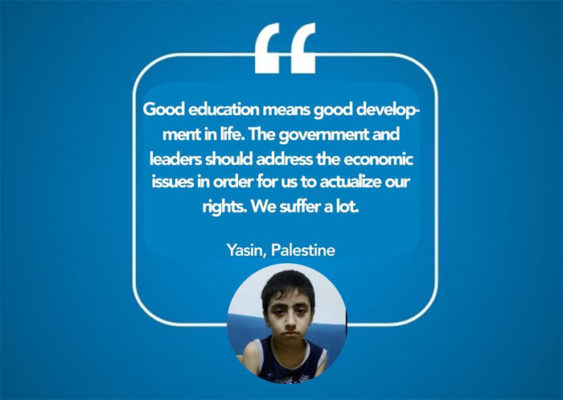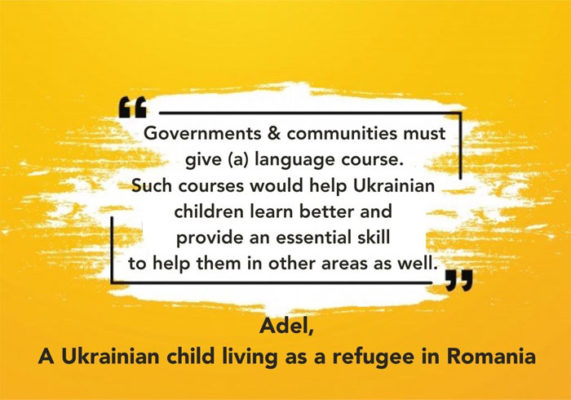Ending Poverty through Achieving Quality Education for All
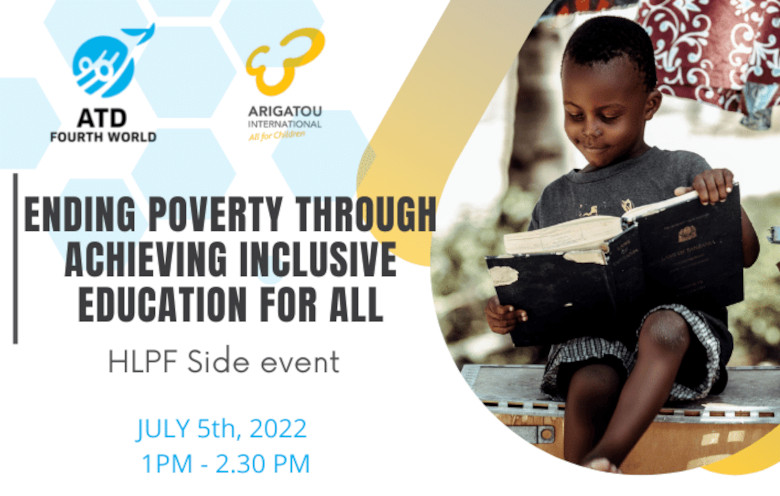
From July 5th to 15th, the 10th session of the High-level Political Forum on Sustainable Development (HLPF), which meets under the auspices of the UN Economic and Social Council (ECOSOC), took place in New York at the United Nations headquarters. The theme was “Building back better from the coronavirus disease (COVID-19) while advancing the full implementation of the 2030 Agenda for Sustainable Development.”
HLPF
The HLPF is the main UN platform on sustainable development. The HLPF reviews the implementation of Sustainable Development Goals (SDGs) listed in the Agenda 2030. All UN Member States as well as representatives from civil society participate in reviewing SDGs. This year, the HLPF reviewed five SDGs, number 4 on quality education, number 5 on gender equality, number 14 on life below water, number 15 on life on land, and number 17 on partnership for the Goals.
For 2022, ATD Fourth World is invited to participate in the HLPF, because of ATD’s expertise on quality education.
With the support and participation of people with direct experience of persistent poverty, a virtual side-event under the aegis of the UN was organized. This side-event brought together an ATD team from Burkina Faso and a delegation from Latin America (Mexico, Guatemala, Peru, and Bolivia) to dialogue with participants from UN agencies, member states, civil society representatives, academics, and children from all around the world.
Ending poverty through achieving quality education for all
On July 5th, the International Movement ATD Fourth World co-organized the side-event, “Ending poverty through achieving quality education for all”, along with Arigatou International.
The moderator, Mr. Kevin Gee, Professor at UC Davis School of Education and Faculty Research Affiliate with the Center for Poverty and Inequality Research, introduced the objective of the webinar: gathering people from diverse backgrounds and experiences so as to have a better understanding of the persistence of poverty and social exclusion, and the solutions to eradicating these problems.
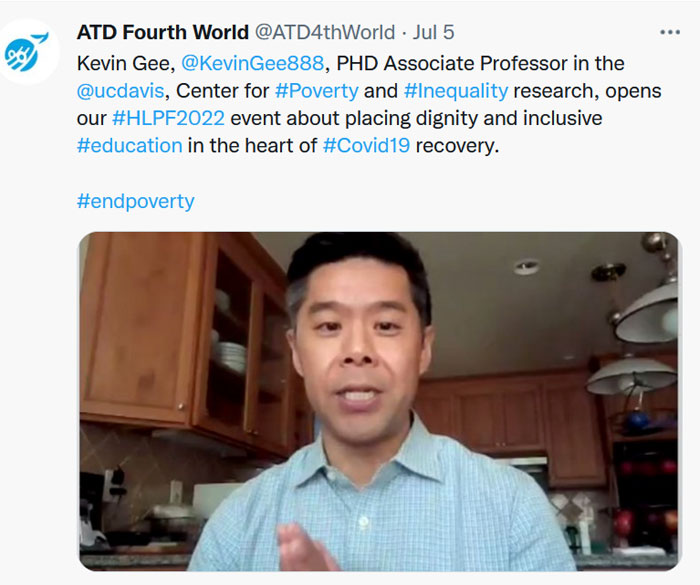
How does discrimination on grounds of poverty perpetuate unequal access to quality education? What are the practices and recommendations to transform education?
Mr. Gee first gave the floor to Ms. Elise Kabre, an activist with lived experience of extreme poverty from Burkina Faso, and Mr. Moïse Compaoré, also an activist and a member of the ATD Fourth World team in Burkina Faso. They emphasized how the insecurity in the country (terrorism, forced displacement) and the lack of resources impact the quality of education (classroom overcrowding). They also raised the issue of persons without official documents:
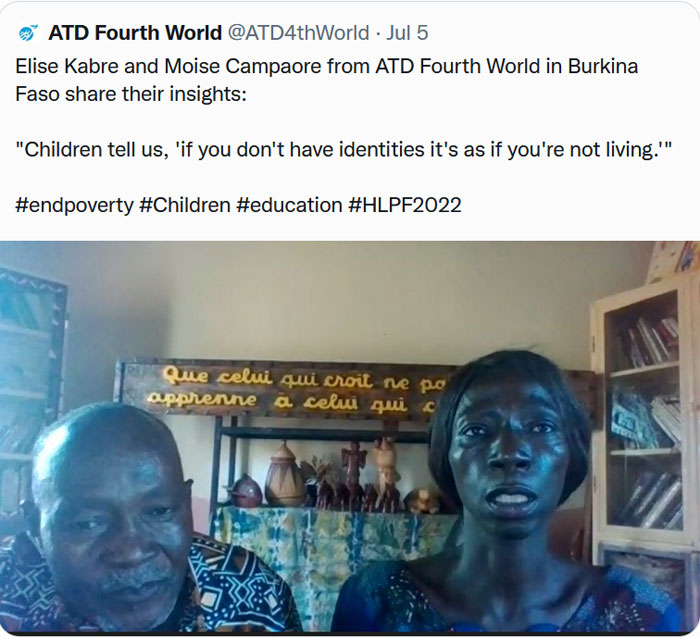
Ms. Kabre talked about Tapori, a worldwide children’s network that helps with educational needs. She then continued by reminding participants that humiliation of parents in poverty at school is often a reality. This has negative consequences for children living in poverty.
“To build the world, those in poverty have to contribute.”
Ms. Elise Kabre
Delegation from Latin America
The moderator then turned to the delegation from Latin America, Ms. Vivi Luis from Guatemala, Ms. Josefina Belida from Peru, Ms. Martha Ticona Asistiri from Bolivia and Ms. Beatriz Monje from Mexico. The first three are ATD activists and the last a member of ATD’s Volunteer Corps. They pointed out five issues to achieve inclusive and quality education for all:
- The gap between public and private education (equal distribution of teaching materials and human resources, similar curriculum, etc.).
- The importance for schools to ensure good nutrition to allow students to be in good physical condition to learn.
- The necessity of ending all forms of discrimination against parents in poverty so that they can be heard and their children feel safe and not ashamed.
- The importance of promoting more vocation time for teachers and training so that they know how to teach children with limited resources.
- The necessity of promoting cooperation and solidarity between students and their families.
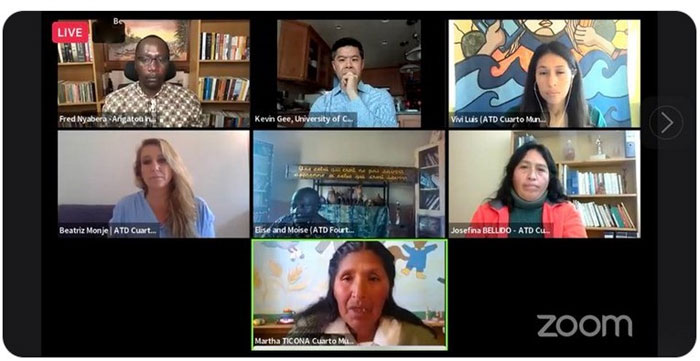
“We often have to choose between eating or buying things for school, between going out to survive or helping with homework”
Ms. Martha Ticona Asistiri
Importance of quality education
The president of ECOSOC, His Excellency Collen Vixen Kelapile, Ambassador of Bostwana, took part in event. During his talk, he pointed out the importance of quality education especially for people living in poverty.
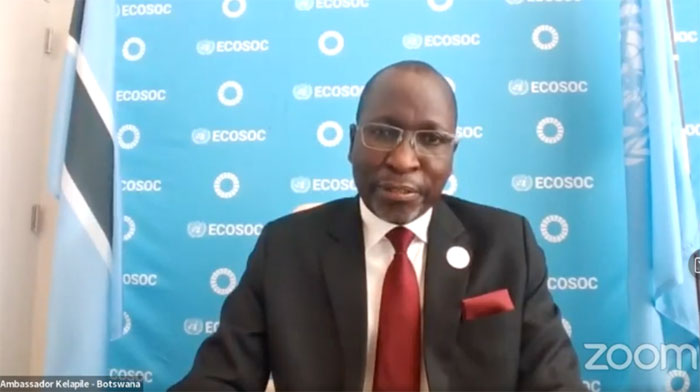
“Education is a powerful transformative tool that enhances people’s participation in public affairs and contributes to the formulation of better public policies and involvement that builds fully inclusive societies”.
His Excellency Collen Vixen Kelapile
Mr. Nicolas Reuge, Senior Adviser Education in UNICEF, joined the conversation and reacted to the activists’ presentations, emphasizing the urgency of bringing kids back to school. Even though some countries managed to set up remote learning, more than 5 million children weren’t reached. Mr. Reuge highlighted the importance of equity and effectiveness of public spending regarding quality education. In some countries children coming from the richest households can get as much as 10 times the level of public resources as children in poverty. This is not because of choice, but a result of the expenditure between lower and higher education.
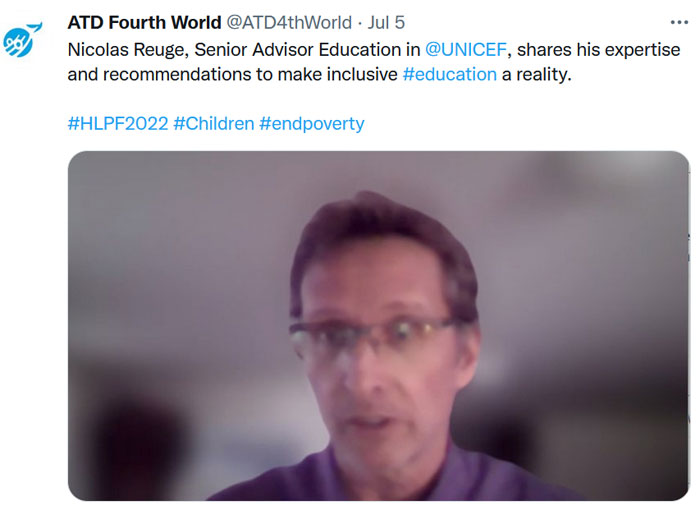
“We need to recognize that there is a learning crisis and it has been exacerbated by the last two years of covid”
Mr. Nicolas Reuge
In order to improve the education of all children, especially the most marginalized, Mr. Reuge proposed three key transitions:
- Readying children for school (self-confidence, learning, nutrition, material aspects…), and preventing school drop-out
- Highlighting the basics in math and literacy (assess learning level to provide catch up learning if needed, teach the fundamentals)
- Preparing children for adulthood with the full range of needed skill sets
How do we go about envisioning quality education from the perspective of children?
Mr. Gee introduced the second part of the webinar with a video of children from around the world (Lebanon, Bosnia, Ecuador, Sri Lanka, etc.), sharing their perspectives on quality education and poverty.


Play with YouTube
By clicking on the video you accept that YouTube drop its cookies on your browser.
Mr. Fred Nyabera, Director of Arigatou International was the last speaker . He emphasized the fact that quality education is not just through school, but also the influence of outside persons (community, parents, etc.). Quality education, he also so stated is linked to community, along with the environment where the children live as well as their nutrition. He returned to the resources divide between of the poorest and the richest, children living in cities and in rural areas, public and private school, and access to digital education.
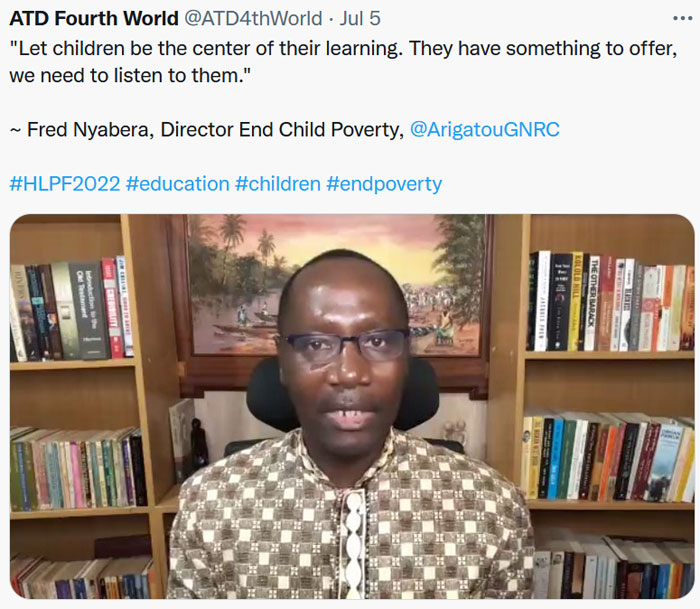
Dialogue with the audience
After the presentations, several topics were discussed by the speakers to address numerous questions from the audience.
The notion of legal existence (i.e. lack of government id or official paperwork) came up again in the Q&A session, with a link to education. Children have to have official paperwork if they want to go to school. Ms. Kabre shared her experience regarding her own child and the difficulties she encountered getting official paperwork for her newborn child and the fact that the father or his family didn’t do this. Normally in Burkina Faso the father registers a new born. With no identity documents, schools will refuse children and they won’t be able to take official tests.
“A child not in poverty is 10 times more likely to have access to education than a child in poverty”
Ms. Beatriz Monje – Mr. Nicolas Reuge
Tremendous effort
Ms. Monje continued the discussion by pointing out that for families in extreme poverty, sending their children to school requires tremendous effort. Unfortunately, when they arrive at school the quality of education is not sufficient. Indeed, the training of the teachers, the school budget, etc. are not enough to ensure quality education. The consequence is that the children start believing that they are not able to learn. Even though it is the system that does not respond to them. Ms. Bellido added that the quality of education in private schools was better and that was not fair for those in poverty.
Mr. Gee, the moderator, closed the session by reaffirming that education is a fundamental human right. That needs to be treated as such across the globe.
“To have education is to be human”.
Mr. Kevin Gee


